Ford Vs. Ferrari. Moneyball. The Founder. The Social Network. All of these movies are centered around iconic companies. But what do two car manufacturers, a baseball team, a fast-food restaurant, and a social media company have in common? Each one has a compelling brand story that people are eager to hear. How you tell your business story will either engage your audience of customers as these movies did, or it will flop. Your story should show your struggles and successes. It should inspire without being corny, and above all else, it should be honest. After all, as Marcus has said, “People buy from people they connect with, and stories they can relate to.”
What is Brand Storytelling?
More than just your company’s backstory, brand storytelling is also a way to illustrate your future. It’s the way your employees communicate your goals, and it’s what sets you apart from your competition. You decide to bolster your brand every day through your actions. It’s your voice, and more importantly, it’s your reputation. Your brand story is the story you tell, and it’s also the story others tell about you.

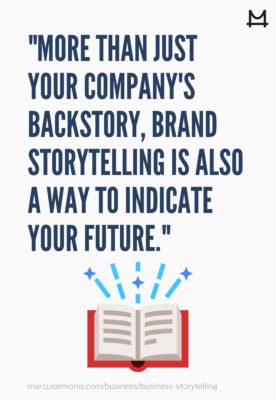
Why is Brand Storytelling Important?
Advertising is not the only way to tell your business story, but it is tremendously essential. It’s helpful to have examples of the messaging we’re talking about. If you’ve ever watched a TV ad that made you roll your eyes because the company tried too hard to seem important or conjure up fond memories, then you’ve seen a failed attempt at brand storytelling. Why would an interest-free checking account make you feel wistful for your childhood?

When Mark Zuckerberg apologized for Facebook’s privacy missteps in 2006, 2008, and then again in 2010, it was a little hard to believe Facebook took its users’ data protection seriously. (Tufekci, 2018).
According to one study, 9 percent of the 1,000 people polled deleted their Facebook account over privacy issues. (Leswing, 2018). Apologizing repeatedly and not fixing mistakes is not a good brand story. Your story will be written by someone else if you let it happen.
On the other hand, Volkswagen successfully marketed itself in the United States a little over a decade after WW2 ended with one excellent ad campaign.
When big, bold, boxy cars were all the rage, VW’s “Think Small” campaign marketed the beetle by showing how tiny and round it was. The ad had few words, and the image of the car was teeny-tiny. The campaign was unique, unexpected, funny, and it gave Volkswagen the feel-good, practical reputation it still enjoys today.
What are the Benefits of Having a Brand Story?
1. When you have a good business story, it makes you look engaged and interesting. It shows that you know why your company does what it does, and it shows the customer what they can expect. It shows that you have skin in the game.

2. Brand storytelling helps you rise above the competition. All things being equal, wouldn’t you rather shop at a company with an excellent reputation and a unique backstory? A great example was when Marcus consulted with the owners of a watch company in Los Angeles. Marcus was intrigued because this company was making money – but also making a difference in people’s lives. Every watch tells time, but how many tell a unique brand story? The company’s concept was different. They donated 10 percent of their profits to 10 different charities from the sale of 10 different watches. Each watch had its own color and was associated with a different charity. This concept was successful because customers loved the story as much as the watches.
3. Your brand story builds relationships. Give people something they can relate to, and they will want to stick around.
4. An honest, likable business story will motivate your employees to come into the office every day. They want to be part of the next chapter in your company’s story.
5. Brand storytelling promotes transparency, and it keeps everybody working toward the same goal. When you repeat something every day, it’s hard to forget it.
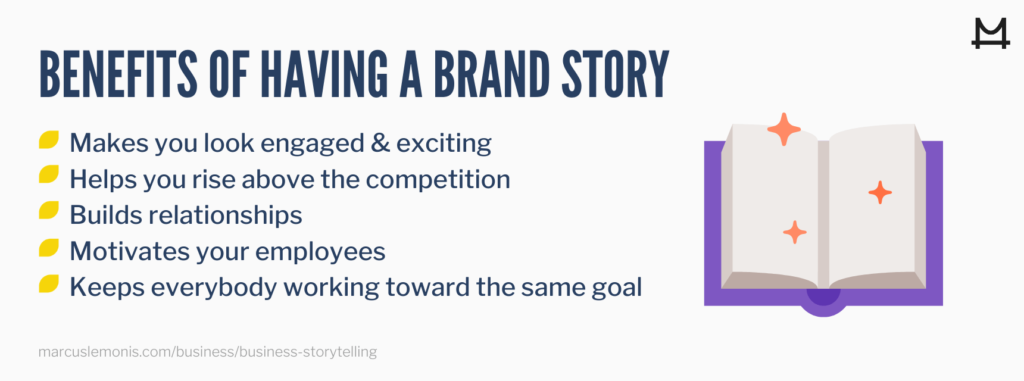
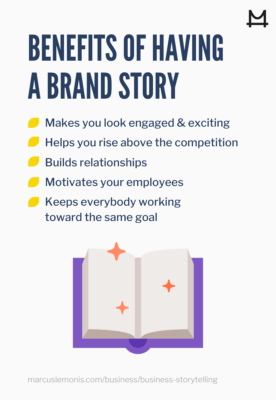
Tips for Creating Your Brand Story
1. Always be Authentic
Why did you start your company? What hurdles did you have to clear? Did you ever stumble? When you tell your story, be sure to include the real-life circumstances that led you to where you are. People relate to struggles and triumphs. This was a valuable lesson Marcus instilled upon the owners of a family-run artisan chocolate company in Pennsylvania. The company also happened to be rich in history as chocolatiers dating back 40 years, a heritage tracing back to Greece, and a heartwarming story of three grown children who made personal sacrifices to help save their father’s livelihood. In this case, these were the main ingredients to a successful brand story.

2. Choose Your Message and Stick With it Everywhere
Your marketing on radio, websites, newspapers, skywriters, or wherever you tell your brand story should remain consistent. You don’t want to send mixed messages to your audience, so once you decide on a message, please don’t change it.
3. Don’t Get too Lofty
As we mentioned before, you don’t want to oversell your business or make your company sound too good to be true. Your lawn mowing service won’t save lives. Your business story should be honest and relatable.
4. Listen to Your Reviews
Your customers and employees will tell you what the important aspects of your company are.
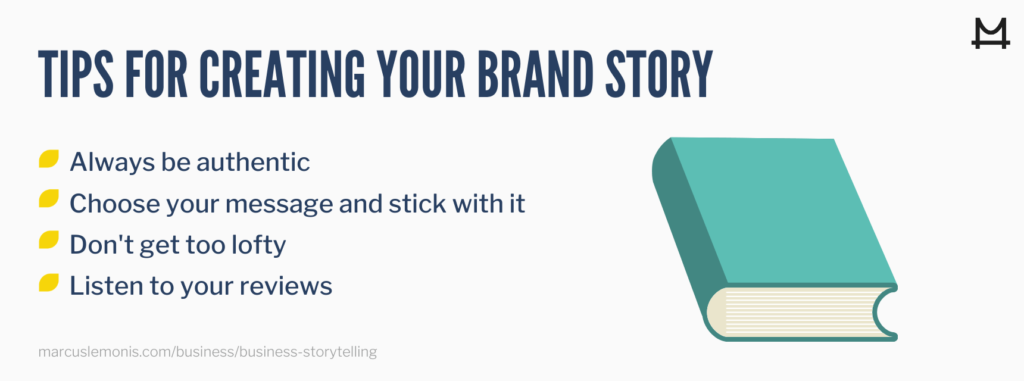
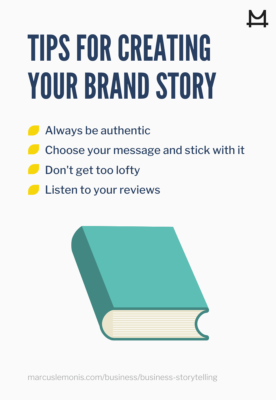
Strategies to Communicate Your Brand Story
1. Saturate the market with your story, but don’t go overboard. Make sure people see your message, but don’t make them sick of seeing it every day. You can do this by diversifying your exposure. You reuse a simple, straightforward ad on Youtube, Facebook, Linkedin, or other sites but you might want to make minor modifications and customizations to each. Don’t put all your eggs in one basket. Diversify.
2. Uniforms for employees, gifts for customers. If your story is about chill, laid-back people who got into the business world, why are your employees wearing suits and ties? Or, if your story is about cutting-edge professionals, your sales team shouldn’t be wearing sandals. A uniform tells your brand story before anybody speaks. Another way to keep your brand in the forefront of your clients’ minds is with branded marketing items tailored to your clients’ interests, such as logo golf tees and insulated cups. If you want to reach college students, lanyards or drink cozies are ideal. Treat your merchandise as another form of brand storytelling.
3. Sponsor charities or events that fit into your brand. If you, a loved one, or a staff member, has sadly been affected by a disease or illness, sponsor a charity run or a support group. Show people that your business story speaks about real people with compassion and authenticity. Giving a little of your time or money to charity goes a long way. Marcus knows, and you should too, that “There is no being generous to a fault. Because there is no fault in being generous.” This is the kind of story nobody gets tired of hearing about.
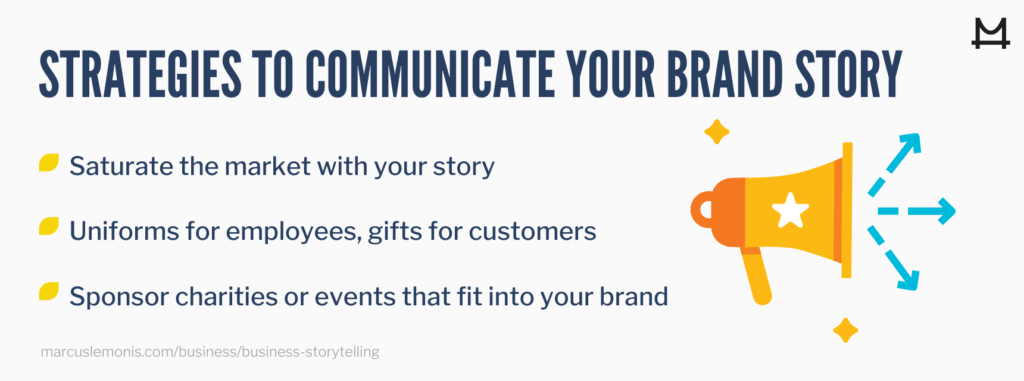
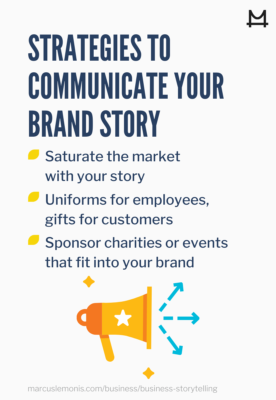
Channels to Communicate Your Brand Story
1. Employees
Your employees should understand your brand story and be able to tell it back to you in their own words. They’re the ones facing the public daily, so let them talk about your company with authority. Marcus always says, “Businesses are based on relationships and relationships are based on people.” Trust your people.
2. Website
You may be tempted to hire a web designer to make the flashiest site in the world, blasting your message of inspiration and business genius to the world. But, that’s not good brand storytelling. Your website should include your story, but don’t hit people over the head with it. When telling your story, you want to answer the five Ws (who, what, where, why, and when), make the answers accessible, and let the customer make their decision. Believe in your story, not distractions or over the top design.

3. Social Media
Honesty is crucial on social media. Authenticity on Twitter, Facebook, or Reddit is critical because the Internet can smell phoniness. Don’t try to be something you’re not. Being snarky or ironically funny is hard to do 24/7, so instead, be helpful. And, if you make your presence known on a platform, be sure to check on your accounts often. A lingering unanswered question or a lousy review can put a negative mark on your brand. That’s not the business story you want to tell.
4. Marketing
Keep your brand storytelling and marketing consistent, engaging, honest, and brief. Humor doesn’t hurt, but it’s tricky to do well. Dollar Shave Club, a company that sells razors and grooming products by mail for a dollar a month, already says its core message in its name. Their video ads are humorous, tell the brand story of how the company started, and they repeat their brief business model at the beginning and the end of the ad to hammer home the point.

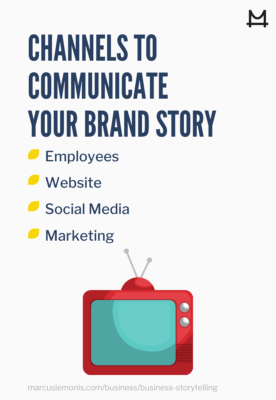
People. Process. Product. These are three of Marcus’ favorite words. They are also three things that are at the heart of every business story, but crafting your own story should be a representation of your unique journey. Treat brand storytelling as an opportunity to share where you’ve been, why you started your company, and where you’re going in the future. If you keep it honest and engaging, your story will be inspirational to all.
- Does your business currently have a brand story?
- How can a brand story benefit your business?
Tufekci, Z. (2018, April 6). Why Zuckerberg’s 14-year apology tour hasn’t fixed Facebook. Retrieved from https://www.wired.com/story/why-zuckerberg-15-year-apology-tour-hasnt-fixed-facebook/
Leswing, K. (2018, April 12). Nearly one in 10 Americans surveyed say they deleted their Facebook account over privacy concerns. Retrieved from
https://www.businessinsider.com/delete-facebook-statistics-nearly-10-percent-americans-deleted-facebook-account-study-2018-4?r=US&IR=T





